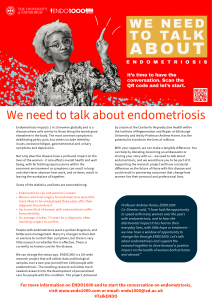About the Project
Our Mission
Our mission is to reduce diagnostic delay and develop personalised treatment approaches for individuals with endometriosis by studying data and biological samples collected from patients over an extended period of time.
Our Objective
The objective of the ENDO1000 project is to accelerate discovery and advance data-driven research into endometriosis diagnosis and treatment.
Our innovative approach will gather rich data that sheds light on the everyday experiences of those living with this condition. By collecting information from participants over time, we’ll be able to spot patterns and make meaningful comparisons among individuals.
Here’s how it works: patients will use an app to share their experiences, creating a unique timeline of their journey with endometriosis. At the same time, smartwatches will track physical activity, sleep, and daily rhythms, giving us a real-time look at their lifestyle. We’ll also gather insights about their diets through questionnaires about their food preferences.
But that’s not all! We’ll delve into the gut microbiome—the tiny organisms living in our intestines—and look at their products, as well as measure inflammation and hormone levels. By combining all this information, we’ll build a detailed picture of how lifestyle choices, surgery and medical treatments impact endometriosis symptoms.
We hope the data collected will allow us to develop treatment guidelines for doctors to allow more personalised treatment plans that are more likely to be effective for individuals with the disease. Together, we can pave the way for a brighter future for those affected by this condition.
Professor Andrew Horne shares new project ENDO1000, a UK-wide research project that will collect data and biological samples from 1000 individuals with endometriosis. The resulting resource will allow much needed research into the development of personalised care for people with endometriosis.
About ENDO1000
ENDO1000 will recruit individuals with endometriosis and, with their permission, use tools to track their disease and health metrics over a two-year period. Through this analysis, we aim to further the research into personalised care for individuals with endometriosis.
Documentation
We will ask participants of the study to document their symptoms and any treatments experienced during the study timeline using their smartphones.
We will also capture information on diet and exercise.
Smartwatches
Some of our study participants will wear smartwatches, six weeks at a time, to capture their movement and sleep patterns during the study.
This will provide real-time data gathering on the patients.
Samples
Participants of the study will collect vaginal swabs, saliva, urine, blood and faeces samples at home over the two-year period and send these to us for analysis.
This will provide deep insight into the progression of the disease.
How we will achieve our objective
Over the next 5 years, the ENDO1000 initiative will aim to deliver a series of key milestones to achieve its objective of influencing change for women suffering with endometriosis. Starting with the project launch, the ENDO1000 team will recruit a number of participants to collect data, begin digital data analysis, conduct findings on the data and socialise the results.



